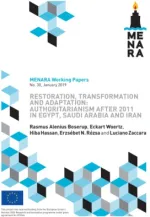Restoration, Transformation and Adaptation: Authoritarianism after 2011 in Egypt, Saudi Arabia and Iran

MENARA Working Papers nº 30
Following the push for reform during the popular uprising in 2011, authoritarianism is once again dominating domestic politics and power relations in the MENA region. Drawing on data collected during field trips to Cairo, Tehran, Beirut and Kuwait city, the authors of this MENARA report analyse three distinct ways in which political leaders in Egypt, Saudi Arabia and Iran have stood their grounds since 2011 by. The report shows that the region’s autocratic leaders have adopted highly distinct strategies to cope with the challenges they have been confronted with internally – including strategies of “restoration”, of “transformation” and of “adaptation”. The report ends by suggesting that European leaders, in spite of their limited leverage and resources, have a long-term strategic interest in fostering alternative forms of political regimes in the MENA region.
Rasmus Alenius Boserup is Senior Researcher at the Danish Institute for International Studies (DIIS). Eckart Woertz is Senior Research Fellow at the Barcelona Centre for International Affairs (CIDOB). Hiba Hassan is a Yemen specialist with over 12 years of experience in analyzing political and security developments. Erzsébet N. Rózsa is an external member of the Institute of Foreign Affairs and Trade (IFAT), Senior Research Fellow at the Institute of World Economics of the Hungarian Academy of Sciences, and Professor at the National University of Public Service, Budapest. Luciano Zaccara is Research Assistant Professor in Gulf Politics at the Qatar University Gulf Studies Center. Boserup is the lead author of this report and he also authored the section on Egypt; Woertz and Hassan contributed the section on Saudi Arabia; Rózsa and Zaccara contributed the section on Iran.